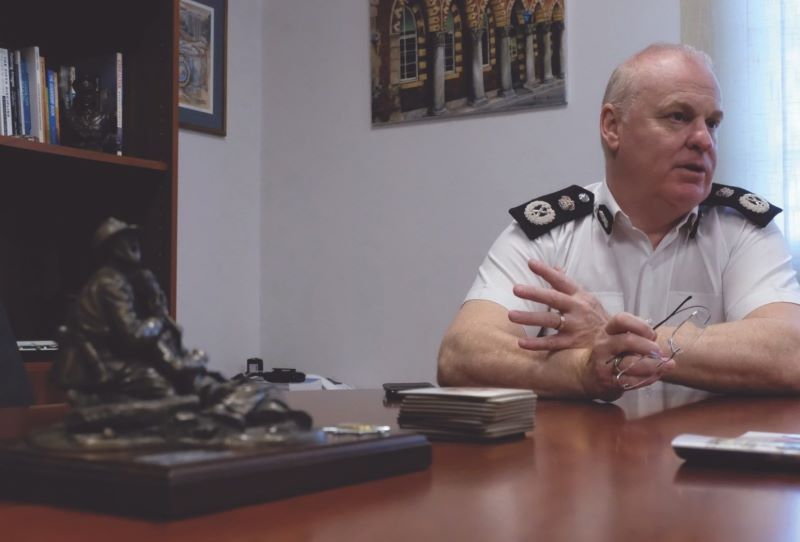+44 1225 29 6129
RGP steps up cooperation with Spanish law enforcement agencies

Royal Gibraltar Police officers will be called to testify in two drug cases set to go before the Spanish courts, Commissioner of Police Ian McGrail confirmed, as he set out plans to take the force’s cooperation with their Spanish counterparts “up a notch”.
One of these cases relates to an incident in which a suspect vessel beached on Sandy Bay and Royal Gibraltar Police officers apprehended the occupants following a pursuit.
The occupants had been chased at sea by Spanish law enforcement officers who had also retrieved bales of cannabis which had been jettisoned overboard.
The suspects were arrested and processed through the courts here for local offences such as importing a RHIB, but as the drug bales were retrieved in Spanish waters they will face drug charges in the Algeciras courts.
Advertisement
“We’ve got a summons from Algeciras asking us to release our officers so they can give evidence there,” Mr McGrail said.
The second case involved a “dynamic” chase at sea on the Western side.
An RGP officer boarded a smuggling vessel and a struggle ensued in which the officer sustained serious injuries to his shoulder, Mr McGrail explained.
“The thing is the justice system [in Spain] – as confirmed by my counterparts in Spain – is quite tedious and the process is not as swift as it is here,” he said.
“It takes a long time for cases to be heard and tried.”
The spirit of cooperation has extended beyond persecutions at sea, as seen in recent months when the sharing of information between law enforcement agencies resulted in four men arrested in Gibraltar as a result of intelligence from the Guardia Civil about suspected money laundering activity on the Rock connected to drug trafficking.
In February, as Guardia Civil officers carried out a series of raids in the Campo that led to the arrest of 29 people, detectives from the RGP’s economic crime unit, backed up by armed officers, simultaneously raided a flat in Ocean Village.
That resulted in the arrest of three Spaniards and one local man on suspicion of money laundering in relation to drug trafficking offences.
“Cooperation has always been there but we want to take it up a notch further,” Mr McGrail said.
“This all arises as a result of the building of trust and relationships.”
“Organised criminality has no borders and when we see that that is happening we have to join up because it’s more effective to tackle them jointly than in silence.”
“And therefore, while we intervene at their request or they intervene at our request, I think that is the best way, more so in this region.”
“It’s well documented that there has been a lot of concern over organised criminality particularly in the hinterland.”
“We can’t sit back and not do anything about it,” he said.
“There will be more activities taking place across a full range of criminality, not just drug trafficking or money laundering.”
“There will be other interventions in the pipeline.”
COUNTER TERRORISM
Mr McGrail also underscored the importance of a joined-up approach in respect of counter terrorism.
“That is something that we want to be joined up on, with any nation not only the one next to us, and very rarely are you going to come across a Government that it not going to be supportive of collaborative work on counter terrorism,” he said, adding “it doesn’t make sense” not to cooperate.
Meanwhile, Project Servator – the policing tactic designed to deter, detect and disrupt a range of criminality, including terrorism – is “building up” having been launched almost one year ago.
Gibraltar was the first location outside mainland UK where this scheme has been approved for use and Mr McGrail said there are other initiatives in the pipeline to support it.
It was launched in June last year following several months of UK and locally-based training, as well as engagement with UK partner organisations.
“We’re already reaping results and there’s good community engagement from the business sector in particular,” Mr McGrail said.
But the project will soon be rolled out to other continents given its success, with trials planned for Australia and New Zealand.
The tactic sees the deployment of highly visible police officers, supported by other resources such as police dogs, firearms officers, plain clothes officers, marine police units, vehicle checkpoints and CCTV, across Gibraltar’s points of entry, city centre, leisure areas and other crowded places.
They are supported by officers specially-trained to spot the tell-tale signs that an individual may have criminal intent.
The deployments are highly unpredictable and intelligence-led.
Advertisement
Popular Category
Popular News




